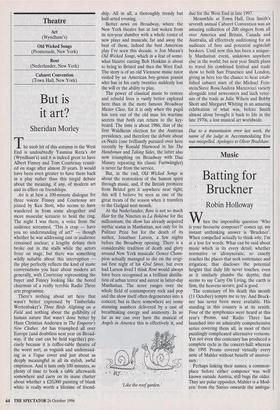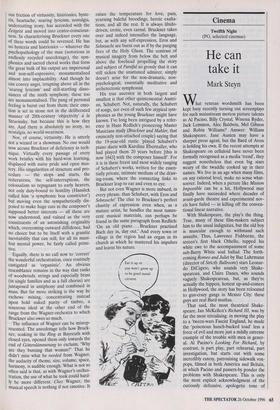Music
Batting for Bruckner
Robin Holloway
When the impossible question 'Who is your favourite composer?' comes up, my instant unthinking answer is 'Bruckner'. When compelled actually to think why, I'm at a loss for words. What can be said about music which in its every detail, whether normative or idiosyncratic, so exactly reaches the places that seek sustenance and irrigation; that discloses the potential heights that daily life never touches, even as it similarly plumbs the depths; that seems to say Carry On Living, the earth is firm, the heavens secure, god is good.
The centenary of his death this month (11 October) tempts me to try. And Bruck- ner has never been more available. His standing in this country is at its zenith. Four of the symphonies were heard at this year's Proms, and Radio Three has launched into an admirably comprehensive series covering them all, in most of their puzzlingly complicated alternative versions. Yet not even this centenary has produced a complete cycle in the concert-hall; whereas the 1995 Proms covered virtually every note of Mahler without benefit of anniver- sary.
Perhaps linking their names, a common- place before either composer was well known outside Austria, still bugs the older. They are polar opposites. Mahler is a Mod- ern: from the Sixties onwards the ambigu-
ous friction of virtuosity, histrionics, hyste- ria, heartache, searing lyricism, nostalgia, undercutting irony, has accorded with the Zeitgeist and moved into centre-conscious- ness. In characterising Bruckner every one of these words could be reversed. He has no hysteria and histrionics — whatever the psychopathology of the man (notorious in endlessly recycled anecdotage), the sym- phonies and sacred choral works that form the great bulk of his output are impersonal and non-self-expressive, monumentalised almost into implacability. And though he can convey angst, irrupting above all in the `searing lyricism' and still-startling disso- nances of the ninth symphony, these too are monumentalised. The pang of personal feeling is burnt out from them; their emo- tion is set in stone not in the deliberated manner of 20th-century 'objectivity' a la Stravinsky, but because this is how they are. And there is absolutely no irony, no nostalgia, no world-weariness.
Nor, of course, virtuosity. He is utterly not a wizard or a showman. No one would now accuse Bruckner of deficiency in tech- nique. Virtually every passage of every work bristles with his hard-won learning, displayed with naive pride and open mas- tery. His singularities of structure and pro- cedure — the stops and starts, the reiterations, the self-interruptions, the colossalism so repugnant to early hearers, not only duty-bound to hostility (Hanslick called him 'a symphonic boa constrictor') but moving even the sympathetically dis- posed to make huge cuts in the composer's supposed better interests — all these are now understood, and valued as the very constituents of an astonishing originality which, overcoming outward diffidence, had no choice but to be Itself with a granitic inevitability that can still, for all its mani- fest mental power, be fairly called primi- tive.
Equally, there is no call now to 'correct' the wonderful orchestration, once routinely castigated as 'organistic'. An obvious resemblance remains in the way that ranks of woodwinds, strings and especially brass (in single families and as a full chorus) are Juxtaposed in antiphony and combined in mass. But far more striking is the way he eschews mixing, concentrating instead upon bold naked purity of timbre, a sonorous ideal at the other end of the range from the Wagner-orchestra to which Bruckner also owes so much.
The influence of Wagner can be misrep- resented. The anecdotage tells how Bruck- ner, soaking in the Ring at Bayreuth with closed eyes, opened them only towards the end of GOtterdammerung to exclaim, 'Why are they burning that woman?' That he didn't miss what he needed from Wagner, the audacity of theme, size, volume, space, harmony, is audible enough. What is not so often said is that, as with Wagner's orches- tration, the use of what he took could hard- ly be more • different. Chez Wagner, the musical speech is nothing if not emotive. It raises the temperature for love, pain, yearning baleful broodings, heroic exalta- tions, and all the rest. It is always libido- driven, erotic, even carnal. Bruckner takes over and indeed intensifies the language, but, as with any self-expression, Eros and Sehnsucht are burnt out as if by the purging fires of the Holy Ghost. The contrast ,of musical imagery from below the belt and above the forehead propelling the story and subject of Parstfal so grossly that it can still sicken the unattuned admirer, simply doesn't arise for the non-dramatic, non- psychological, essentially meditative and archetectonic symphonist.
His true ancestor in both largest and smallest is that other quintessential Austri- an, Schubert. Not, naturally, the Schubert of songs, nor even of such few atypical sym- phonies as the young Bruckner might have known. I've long been intrigued by a refer- ence in Hans Redlich's pioneering Master Musicians study (Bruckner and Mahler, that eminently non-attached couple) saying that the 19-year-old rustic 'played Schubert's piano duets with Karoline Eberstaller, who had played them 20 years before [this is now 1843] with the composer himself. For it is in these freest and most widely ranging of Schubert's works, written for the essen- tially private, intimate medium of the draw- ing-room, where the connecting links to Bruckner leap to ear and even to eye.
But not even Wagner is more imbued, in every phrase, than Schubert, with Eros and Sehnsucht! The clue to Bruckner's perfect chastity of expression even when, as a mature artist, he handles the most tumes- cent musical materials, can perhaps be found in the same paragraph from Redlich: `On an old piano ... Bruckner practised Bach day in, day out.' And every town or village in the region had an organ in its church at which he mastered his impulses and learnt his nature.



















































































 Previous page
Previous page